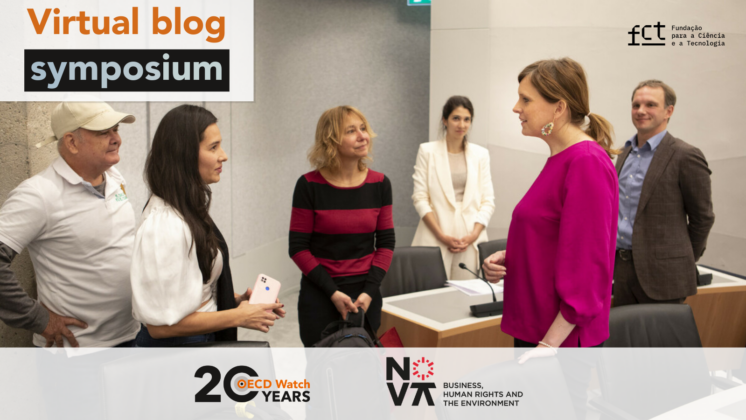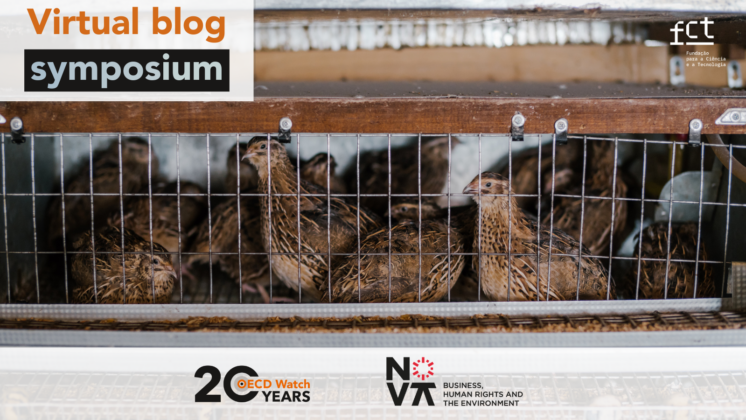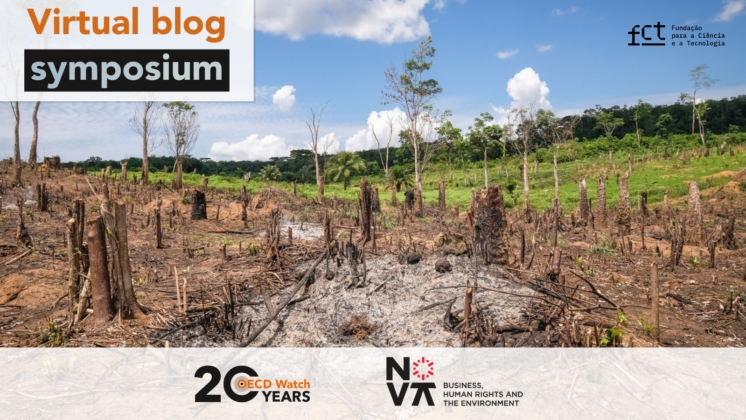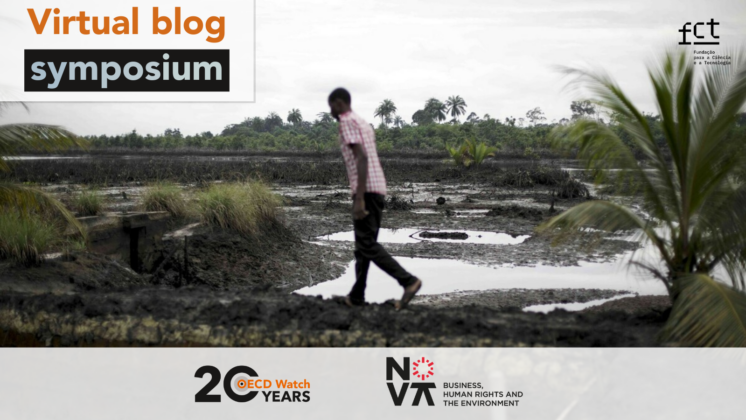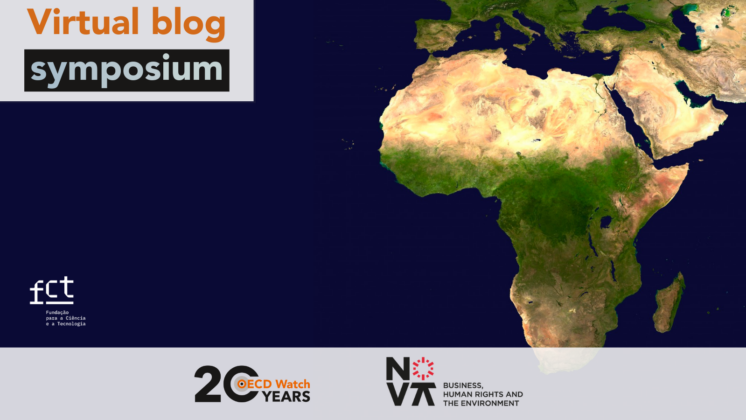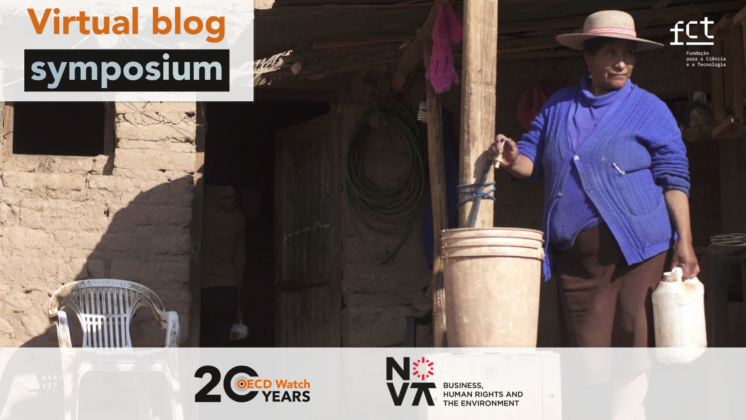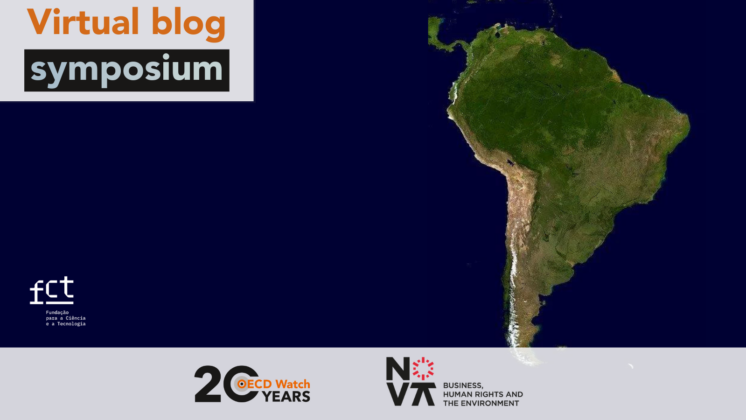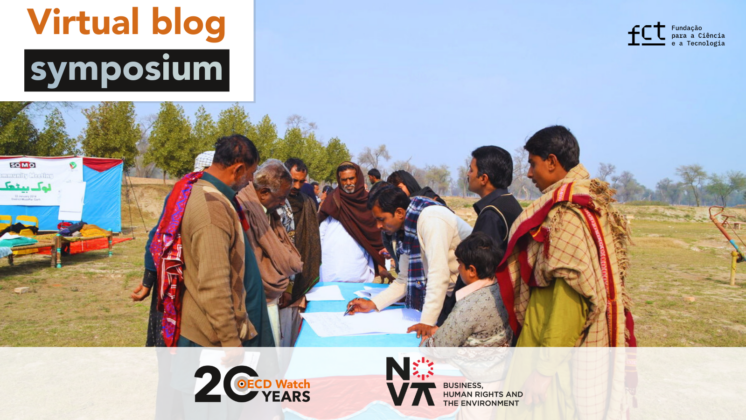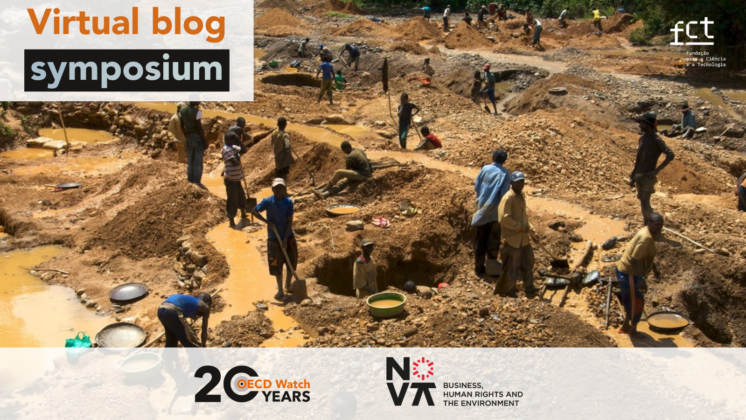By Katharine Booth and Laura Íñigo Álvarez
Blog symposium co-organised by OECD Watch and NOVA School of Law
OECD Watch and the NOVA Centre on Business, Human Rights and the Environment partnered together to facilitate discussion on the June 2023 revision of the OECD Guidelines for Multinational Enterprises on Responsible Business Conduct through the virtual symposium Exploring new frontiers in the updated OECD Guidelines. The purpose of the symposium was to delve into the updated OECD Guidelines through global multi-stakeholder perspectives on progress, strengths, and weaknesses of the new text. Additionally, the symposium aimed to discuss the connections and coherence of the Guidelines and legislative initiatives focused on corporate accountability across the globe, including the impending EU Corporate Sustainability Due Diligence Directive (CSDDD) and other regional initiatives.
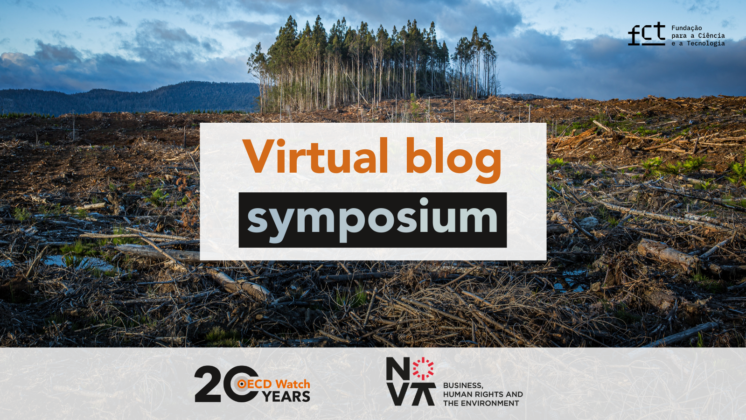
Responsible business conduct standards for companies
Improved, notable, and new corporate standards…
Blog contributors to the symposium, experts in their respective fields, highlighted key updates to the Guidelines with the potential to meaningfully impact corporate policies and practice. Chiara Macchi welcomed the inclusion of new and notable text on climate change and the corporate responsibility to conduct climate due diligence. Blake Harwell stressed the significance of the revisions to the Employment and Industrial Relations chapter, which was amended to cover all workers – not just employees – in corporate value chains. Caroline Omari Lichuma also highlighted the importance of new text meaningful stakeholder engagement in due diligence processes, including with vulnerable and marginalised people, such as human rights defenders and Indigenous Peoples. Another revision with the potential for ground-breaking impact is the inclusion of new text on good animal welfare standards, which Michelle Baxter Wickham, Katie Arth, and Sophie Aylmer describe as “ha[ving] the potential to transform the lives of billions of animals”. Additionally, Leonard Feld appreciated the inclusion of the notion of “enhanced due diligence” in relation to marginalised and vulnerable individuals, in situations of armed conflict or high risk and situations concerning risks to biodiversity in protected areas.
… But with some gaps and requiring more OECD guidance
Some contributors pointed out gaps and other weaknesses in the updated text. Shreeja Sen criticised the glaring gaps in the Science, Technology, and Innovation Chapter, including the failure to recognise the financial value of data and therefore the immense power companies holding data wield, and the absence of references to emerging/frontier tech and the need for their regulation. Joan Carling also critiqued the reference to Indigenous Peoples’ rights as individual rather than collective rights, as they are referred to in United Nations instruments.
Other authors also called for additional OECD guidance, similar to the OECD’s existing sectoral guidances on due diligence, on issues included in the Guidelines. Joan Carling urged the publication of corporate guidance on incorporating Indigenous Peoples’ perspectives into the due diligence process, including on respecting the right to free, prior, and informed consent (FPIC). Michelle Baxter Wickham, Katie Arth, and Sophie Aylmer also advocated for guidance on companies’ new responsibilities to respect good animal welfare standards in the updated Guidelines. Moreover, Janneke Bazelmans and Isabelle Geuskens raised concerns about the narrow definition of Just Transition in the Guidelines, which could leave key justice dimensions unaddressed, adding, “A Just Transition to renewable energy hence requires the unveiling and addressing of interconnected and deep-rooted systemic traps, which have held many so-called ¨developing¨ countries back for decades”.
Alignment between the Guidelines and existing and upcoming corporate accountability standards and laws
The updated Guidelines are based on existing instruments…
Several authors pointed out that the updates to the Guidelines drew on an array of well-known OECD and international (responsible business conduct) standards, including OECD (sectoral) due diligence guidance, guides for NCPs when handling complaints, and previous decisions and statements of OECD National Contact Points (NCPs). In her blog, Danielle Anne Pamplona highlighted that the revised text on human rights defenders and corporate disclosure in the Guidelines is harmonised with the Escazú Agreement, noting: “It is hoped that these texts can be combined to demand the rights they protect, representing progress that can be measured beyond the language they use, and that represent real and tangible positive impacts.” Joan Carling also welcomed the broad alignment between the updated Guidelines and the UN Declaration on the Rights of Indigenous Peoples, especially given the disproportionate impacts of corporate activities on Indigenous Peoples. The resulting Guidelines text is, as Leonard Feld aptly concludes in his blog, “not a revolution, but a consolidation of the state-of-the-art.”
… And the EU CSDDD should be harmonised with the Guidelines
Several authors also discussed the updated Guidelines in the context of the European Union’s proposal for a CSDDD, for which only today it has been announced that the Council and European Parliament have reached a provisional deal. In this regard, Joseph Wilde-Ramsing emphasised the importance of the EU CSDDD being aligned with the strong standards in the Guidelines, including with regard to the need for companies to consider their downstream impacts as part of due diligence, and for multi-stakeholder initiatives or industry auditing/certification schemes to not substitute for a company’s own actions to address impacts. Chiara Macchi and Caroline Omari Lichuma highlighted the need for the EU CSDDD to cover corporate climate change impacts and include strong text on meaningful stakeholder engagement, respectively. Otgontuya Davaanyam and Markus Krawjewski also affirm that states should align their human rights due diligence legislations, including the EU CSDDD, with the current update of the Guidelines, illustrating the example of the French NCP that “appears to attempt to link the NCP’s case handling system to its own binding human rights due diligence legislation”.
Important role of NCPs in ensuring implementation of the Guidelines
Strong corporate standards, however, are no more than words on paper without equally strong implementation by companies, governments, and their NCPs. Blake Harwell urged OECD governments to do more through their NCPs to implement the new standards in the Guidelines, including to be more demanding of companies to contribute to remediation: “Anything less and the Guidelines will continue to be good intentions without meaningful impact.” In the context of lack of (corporate) accountability in Africa, Jonathan Kaufman urged for NCPs to have strong architectures to ensure they make a difference on the ground, including by making determinations of (non-) compliance with the Guidelines and recommending consequences for corporate bad faith, such as for non-implementation of agreements reached in mediation and more broadly in NCP procedures. Otgontuya Davaanyam and Markus Krawjewski also emphasised the role that NCPs should play in assisting governments in implementing and promoting coherence of policies and effectively supporting governments in fulfilling their responsibility to protect.
Conclusion: New standards must lead to changes on the ground
This blog symposium was convened in recognition of the significant developments in the business and human rights field that have taken place during the last years and especially in 2023. It is important to take stock of these developments and to recognise the leaps and bounds that have been taken and are continuing to take place in terms of responsible business conduct, both in voluntary standards for companies and in binding legislative initiatives on human rights and environmental due diligence. Indeed, today’s announcement on the CSDDD is a significant step towards enhancing the protection of human rights and the environment across the world. These developments, however, must lead to change on the ground. As Joan Carling aptly stated, “Ultimately, the success of these efforts will be measured not only by adherence to the Guidelines but by the positive impact they create in the lives of those most affected.”
The blog symposium has been co-organised NOVA School of Law and OECD Watch. The organisers sincerely thank all of the blog authors for their important and insightful contributions.
About the authors and organisers
 Katharine Booth is a policy advisor and researcher at OECD Watch, a global network of civil society organisations focused on achieving effective remedy for corporate harms by using the OECD Guidelines and the Guidelines’ non-judicial National Contact Point (NCP )grievance mechanism. Katharine leads OECD Watch’s activities on NCP complaints and also researches issues related to responsible business conduct and the OECD system.
Katharine Booth is a policy advisor and researcher at OECD Watch, a global network of civil society organisations focused on achieving effective remedy for corporate harms by using the OECD Guidelines and the Guidelines’ non-judicial National Contact Point (NCP )grievance mechanism. Katharine leads OECD Watch’s activities on NCP complaints and also researches issues related to responsible business conduct and the OECD system.
 Laura Íñigo Álvarez is a postdoctoral researcher in international law at the NOVA School of Law where she develops a research project on business, human rights and access to remedies funded by FCT. She is also the Scientific Coordinator of the NOVA Centre on Business, Human Rights and the Environment.
Laura Íñigo Álvarez is a postdoctoral researcher in international law at the NOVA School of Law where she develops a research project on business, human rights and access to remedies funded by FCT. She is also the Scientific Coordinator of the NOVA Centre on Business, Human Rights and the Environment.
About the blog symposium
2023 is a momentous year in the corporate accountability world. In June, not only did the OECD adopt key revisions to the newly renamed OECD Guidelines for Multinational Enterprises on Responsible Business Conduct, but the European Parliament also agreed on its position on the proposed directive on corporate sustainability due diligence. In recognition of these important events, NOVA BHRE and OECD Watch are co-hosting a blog symposium in October and November 2023 focused on the updated OECD Guidelines in the context of the current corporate accountability landscape.
NOVA Knowledge Centre for Business, Human Rights and the Environment is a multidisciplinary academic centre within NOVA School of Law. The centre has made significant interdisciplinary research contributions regarding business and human rights initiatives, which aims to cultivate conscientious business practices that prioritise the protection of human rights, decent work and environmental integrity across worldwide value chains.
OECD Watch is a global network comprising of more than 130 civil society network organisations in over 50 countries. OECD Watch works towards the implementation and effectiveness of the OECD Guidelines through strengthened global coordination, advocacy with OECD member states and international institutions, and by providing case support and capacity building to civil society.
The views and opinions expressed in this blog represent the views of the author and does not necessarily represent those of OECD Watch or NOVA School of Law.

